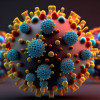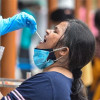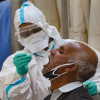
 Dr. V S Natarajan
Dr. V S Natarajan
COVID-19: The Impact On Human Immune System
The novel coronavirus classified as COVID-19 is the latest and the deadliest of such viral pandemics to have occurred in the modern world. With over 1.3 million infected people and more than 70 thousand fatalities in 200 plus countries, it is an unprecedented global health scare.
The wildfire like spread of this virus and the large number of fatalities are primarily due to the way it impacts our body, especially our immune system. The virus spreads via droplets coming out of an infected person’s mouth or nose and can enter another person’s body by respiratory ingestion or when a person touches a surface contaminated with the virus. When we look at the mortality rate of this virus, one can see that in more than 80% of the infected people, it produces only mild effects and eventually the person is cured just like a common flu infection.
The severity of the infection and its impact is also dependent upon the organ where it settles in the body. For instance, if it lodges in the lungs then a person is likely to experience breathing problems, but, if it enters the gastro-intestinal system then it can also cause diarrhoea.
COVID-19 first enters the body’s cells by attaching itself to a protein called ACE2 receptor. Since, most of these receptors are present either in the lungs or the intestines, these are the two organs likely to be affected by the virus.
Subsequently, the virus starts replicating itself and that’s when our immune system kicks in with a strong counterattackto stop it from spreading. The infected cells are then bombarded with virus-specific antibodies and T cells.
According to researchers working on COVID-19 studies, this is followed by a highly amplified response by the body’s immune system and the symptoms become more severe. About 20% of all infected people experience this second stage where the virus reproduces at a rate that the body’s immune mechanisms are unable to control. It then spreads in the lungs and starts causing breathing problems. In more complicated cases, the patients suffer from pneumonia or acute respiratory problems. The airways become inflamed and the person progressively faces difficulty in breathing.
In the most advanced stage of the infection, the virus itself becomes less active, but, it is the rapidly rising response from the body’s immune system which causes greater inflammation. In such a situation, kidney and heart functions are disrupted and the patient experiences a multiple organ failure. This is when saving the patient’s life becomes extremely difficult.
Since the elderly or those suffering from chronic ailments like diabetes usually have a weaker immune system, they are more at risk from this viral pandemic. Another major risk category is of the healthcare workers. Since they keep coming into contact with the COVID-19 patients, their exposure to the virus is much higher.
Boosting Immunity to Prevent the COVID-19 Infection
One of the best ways to keep the infection at bay is to follow the social distancing and hygiene related guidelines issued by authorities. Further there are certain steps that we can take to boost our body’s immunity:
Vitamin C intake – We should consume more fresh and citrus fruits which are rich in vitamin C. The vitamin C is a renowned immunity booster and consuming such foods will give us a greater chance of staying safe from the infection. People suffering from Vitamin C deficiency are advised to consume tablets to make up for it.
Exercise and balanced lifestyle – Our body’s immunity is impacted by factors like lack of sleep, stress and sedentary lifestyles. Hence, it is important to integrate physical activities like exercise into our routine. Doing Yoga and meditation can be great stress relievers and we must also sleep well to replenish our body’s vitality.
COVID-19 doesn’t have a vaccine or a standard treatment procedure at present. Hence, prevention and precaution are the tools that we need to rely upon. Further, if you have reason to believe that you have been infected then you must contact the healthcare helpline numbers of your area and remain isolated from others including your family members during the quarantine stage.

Dr. V S Natarajan
Dr. Vallalarpuram Sennimalai Natarajan is a renowned Geriatric Physician, Educationist, Author and a Social Worker. He is recognized as the Father of Geriatric Medicine in India as he introduced and popularized this discipline in the country. Born on June 10, 1939, Dr. Natarajan received Bachelor of Medicine degree in 1965 and Masters degree in Medicine in 1968 from the University of Madras. He underwent training in Geriatric Medicine in the U.K. as early as 1974 and after four years of specialization he received MRCP (UK) degree and attained accreditation as a specialist in Geriatric Medicine from Joint Committee on Higher Medical Training, U.K. The Royal College of Physicians, Edinburgh awarded its Fellowship to him as FRCP (Edin) in 1987.







Please login to comment on this article